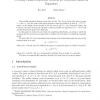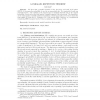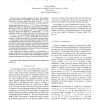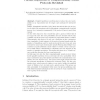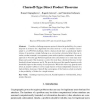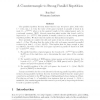108
click to vote
ECCC
2008
15 years 2 months ago
2008
In a two player game, a referee asks two cooperating players (who are not allowed to communicate) questions sampled from some distribution and decides whether they win or not base...
111
click to vote
ECCC
2010
15 years 2 months ago
2010
The parallel repetition theorem states that for any Two Prover Game with value at most 1 - (for < 1/2), the value of the game repeated n times in parallel is at most (1 - 3 )(n...
112
click to vote
STOC
1995
ACM
15 years 5 months ago
1995
ACM
We show that a parallel repetition of any two-prover one-round proof system (MIP(2, 1)) decreases the probability of error at an exponential rate. No constructive bound was previou...
148
click to vote
COCO
2010
Springer
15 years 6 months ago
2010
Springer
—Raz’s parallel repetition theorem [21] together with improvements of Holenstein [12] shows that for any two-prover one-round game with value at most 1 − (for ≤ 1/2), the v...
105
click to vote
COCOON
2010
Springer
15 years 6 months ago
2010
Springer
The parallel repetition theorem states that for any two provers one round game with value at most 1 − (for < 1/2), the value of the game repeated n times in parallel is at mo...
108
click to vote
TCC
2007
Springer
15 years 8 months ago
2007
Springer
Abstract. Parallel repetition is well known to reduce the error probability at an exponential rate for single- and multi-prover interactive proofs. Bellare, Impagliazzo and Naor (1...
125
click to vote
CRYPTO
2007
Springer
15 years 8 months ago
2007
Springer
Consider a challenge-response protocol where the probability of a correct response is at least α for a legitimate user and at most β < α for an attacker. One example is a CAP...
130
click to vote
COCO
2007
Springer
15 years 8 months ago
2007
Springer
Motivated by the study of Parallel Repetition and also by the Unique Games Conjecture, we investigate the value of the “Odd Cycle Games” under parallel repetition. Using tools...
115
click to vote
FOCS
2008
IEEE
15 years 8 months ago
2008
IEEE
The parallel repetition theorem states that for any two-prover game, with value 1 − (for, say, ≤ 1/2), the value of the game repeated in parallel n times is at most (1 − c)�...
114
click to vote
FOCS
2009
IEEE
15 years 8 months ago
2009
IEEE
— The question of whether or not parallel repetition reduces the soundness error is a fundamental question in the theory of protocols. While parallel repetition reduces (at an ex...

